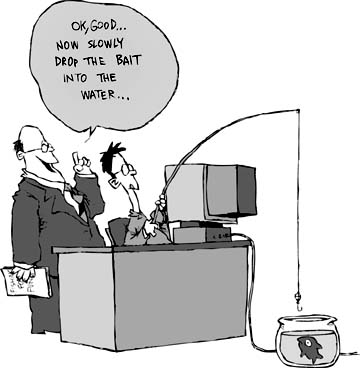

A forum for Hawaii's
business community to discuss
current events and issues
CREATING EXCELLENCE
Learning to learn
Old mind-sets frequently must
be abandoned to give fresh
concepts a proper welcome
Many of us are familiar with the following piece of sage advice: "Give a man a fish and you feed him for a day. Teach him how to fish and you feed him for a lifetime." A recent conversation with a CEO colleague of mine brought to light an entirely new slant on this age-old wisdom.
She was frustrated because she knew she was not relating as well to her vice presidents as they or she would have liked. Every time she tried to do what she thought would make the situation better, it would work for a while only to revert shortly thereafter. She threw up her hands and lamented: "I want to learn, but it just seems like I can't. You're my coach! What should I do?"
To her credit, my response -- "Perhaps we need to work more on your teachability before you'll experience the rewards you seek from your efforts to learn" -- did not lead her to show me the door.
Making ourselves open to being taught is akin to doing the work farmers must do to prepare their fields before planting new crops. There are several attitudes and beliefs that, if they are not "weeded out," can easily act to choke off the sustainability of any well-motivated attempts to learn something new.
Perfectionism is one attitude that seriously erodes teachability. Progress and steady improvement are the best we can ever hope for. If we continue to expect or believe in perfection, the first sign of normal ups and downs can sap our energy and motivation. Mistakes become self-defeating vs. self-motivating.
Further, I tried to help her see that sometimes an old habit must be uprooted or pruned in order to make room for a new one. If your success to date has been built on your ability to come up with your own solutions to problems -- the faster, the better -- helping your people learn how to figure out their own solutions is going to be a challenge for you. Like a tennis player with an overdeveloped forehand stroke, you will need to make some conscious efforts to bring your backhand into play.
Because those muscles are a bit rusty, they bring us back face to face with our first point above: the need to tolerate slow progress and not expect immediate perfection. The reward, of course, for going through this period where our teachability is being stressed is that we add a new skill to our own behavioral repertoire.
The third set of issues that affect our readiness, willingness and ability to be taught are more psychological but nonetheless vital.
In her frustration at having done everything she could think of on her own to solve her problem, my colleague finally surrendered to a fundamental fact of our human natures when she lamented, "What should I do?"
While it might sound like an improbable conundrum, relationship-oriented problems, by their nature, cannot be resolved alone. They require the reliance on a relationship. In other words, left to her own devices, my colleague could only expect to get similar results.
So, in asking for help, my colleague had to make herself vulnerable. She had to admit she was imperfect, else she'd have been able to solve the problem by herself. And a healthy dash of humility had to be added alongside a well-deserved reservoir of pride and self-confidence.
So we can now return to our opening piece of wisdom and reframe it in terms that speak directly to the challenge of management development: "Give me a skill and I'm more effective today. Help me learn how to be more teachable, and I can be more effective for a lifetime."
Irwin Rubin is a Honolulu-based author and president of Temenos Inc., which specializes in executive leadership development and behavioral coaching, communication skill-building training and large-system culture change. His column appears twice a month in the Honolulu Star-Bulletin. Send questions and column suggestions to temenos@lava.net, or visit temenosinc.com.
To participate in the Think Inc. discussion, e-mail your comments to business@starbulletin.com; fax them to 529-4750; or mail them to Think Inc., Honolulu Star-Bulletin, 7 Waterfront Plaza, Suite 210, 500 Ala Moana, Honolulu, Hawaii 96813. Anonymous submissions will be discarded.
